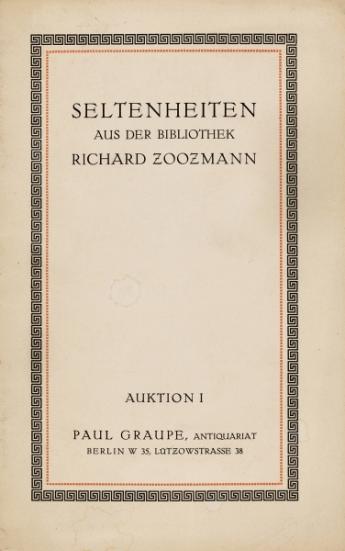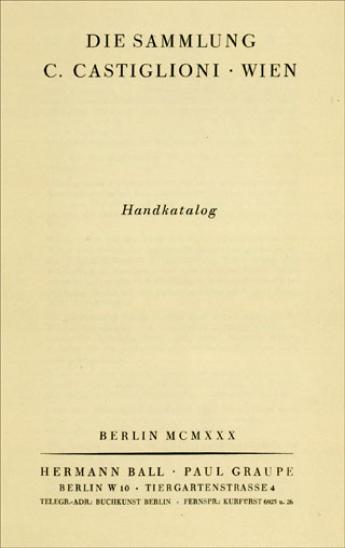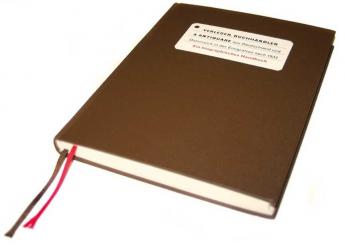Verband Deutscher Antiquare e.V.
Paul Graupe (1881-1953) Antiquarian Booksellers in Exile

Ernst Fischers biographical handbook "Verleger, Buchhdler & Antiquare aus Deutschland und terreich in der Emigration nach 1933" reconstructs the biographies of all German and Austrian booksellers, publishers and auctioneers who emigrated from Germany after 1933. The International League of Antiquarian Booksellers is proud to publish some of the most impressive stories told in Ernst Fischers book on its website. This article in a series of 25 booksellers' biographies is dedicated to Paul Graupe.
Paul Graupe was born in Trebbin near Berlin in the year 1881. After school he joined the antiquarian book trade as an apprentice in the company of Joseph Jolowicz and Ernst Rehfeld in Posen. Then he worked with Lipsius and Fischer in Kiel, Gustav Fock in Leipzig, Friedrich Cohen in Bonn, Jacques Rosenthal in Munich and, finally, with Martin Breslauer in Berlin. As early as July 1907 Graupe took over the antiquarian book shop of Georg Lissa in Berlin (Kochstra 3) which had been founded in the year 1881, when Graupe was born. Paul Graupe gave the shop his own name and moved it to Berlin: Lzowstra 38.
Soon Paul Graupes antiquarian bookshop became one of the most famous auction houses in Berlin, next to the companies of Max Perl and Ernst Henrici. Between 1916 and 1936 Graupe held 148 auctions in which he sold early printed books along with decorative prints and drawings. In that short period Graupe auctioned great libraries and collections, for example in auction 1 the Library of Richard Zoozmann, and he gained a worldwide reputation. His career came to an end when the Nazis forced him to hand his business over to Hans Walter Lange in 1936.
Paul Graupe emigrated to Paris together with Arthur Goldschmidt where they both continued dealing with rare books and prints. Their business was confiscated in 1940. Graupe was once again forced to emigrate, now to New York where he immediately started dealing with rare books and prints again. In 1945 he obtained the American citizenship.
In his later years and after his wifes death, he returned to Europe, lived in Paris and stayed many times in Switzerland and in Baden-Baden to cure his tuberculosis. There he died in 1953.

Graupe, Paul 29. 5. 1881 Neu-Trebbin I Mark Brandenburg 9. 2. 1953 Baden-Baden; Antiquar, Kunsthdler.
Paul Graupe begann sofort nach der Schulzeit mit einer Lehre bei JOSEPH JOLOWICZ und ERNST REHFELD in Posen, anschliend sammelte er Kenntnisse bei LIPSIUS UND FISCHER in Kiel, GUSTAV FOCK in Leipzig, FRIEDRICH COHEN in Bonn, JACQUES ROSENTHAL in Mchen und MARTIN BRESLAUER in Berlin.
Schon im Juni 1907 machte er sich in Berlin selbstdig, indem er das 1881 gegrdete Antiquariat von GEORG LISSA in der Kochstra 3 ernahm und unter seinem Namen weiterfrte; 19II verlegte Paul Graupe sein Gescht in die Lzowstra 38. Neben Auktionshsern wie denen von Ernst Henrici und Max Perl entwickelte sich Graupe schnell zum renommiertesten Auktionator in Berlin: Er konnte sein Unternehmen in den 2oer Jahren, ohne er gros Kapital zu verfen, zu einem weltbekannten Auktionshaus ausbauen.
Zwischen 1916 und 1936 frte Graupe 148 Auktionen durch. Wrend er sich anfangs noch auf bibliophiles Antiquariat beschrkte, erweiterte er seine Auktionen bald auf dekorative Graphik und Malerei. Aufgrund seines Weltrufs und der damit verbundenen Deviseneinnahmen bekam Graupe noch im Februar 1936 eine Sondergenehmigung, als jischer Unternehmer Auktionen abhalten zu knen. Wenig sper wurde sein Buch- und Kunstauktionshaus zugunsten von Hans Walter Lange arisiert, der es bis Kriegsende leitete; der Firmenname Antiquariat PAUL GRAUPE wurde mit September 1937 als erloschen gemeldet.
Nachdem es Paul Graupe gelungen war, ausreichende Geldmittel an den Nazibehden vorbei ins Ausland zu transferieren, hatte er Ende 1936 Deutschland - zusammen mit Arthur Goldschmidt - verlassen, um sich in Paris niederzulassen (ursprglich war London geplant); wegen Sprachproblemen handelte er von seiner Pariser Wohnung aus. Im Jahr 1940 wurden seine gemeinsam mit Goldschmidt betriebene Handelsgesellschaft sowie Kunstgegenstde aus privatem Besitz von der Vichy-Regierung beschlagnahmt, so dass Graupe sich gezwungen sah, nach New York zu ersiedeln.
Auch dort wirkte er im Hintergrund, ohne ein offenes Ladengescht zu betreiben; Paul Graupe erhielt 1945 die amerikanische Staatsbgerschaft. Nach dem Tod seiner Frau kehrte er nach Europa zurk, lebte zurkgezogen in Paris, hielt sich aber ter zur Behandlung seiner Htknochentuberkulose, an der er seit seiner Jugend litt, zu Kuren in der Schweiz und auch in Baden-Baden auf, wo er verstarb.

Literature
DBE; StAL, F 3288; Adressbuch der Antiquare Deutschlands und des gesamten Auslands. Mit selbstbiographischen Beitren bedeutender Antiquare. Weimar: Straubing & Mler 1926 S. 16-18; Deutscher Wirtschaftsfrer ( 1929) Sp. 768; Dt. Reichsanzeiger Nr. 203 vom 3 9 1937; Dt. Reichsanzeiger Nr. 277 vom 1. 12. 1937; Verlagsverderungen 1937-1943; Aufbau vom 11. 4 1941; GEORG ECKE: Paul Graupe . ln: Bbl. (FfM) Nr. 24 vom 24. 3. 1953 S. 129 f.; WALTER KRIEG [Nachruf]. ln: Das Antiquariat Nr. 9vom 10. 3. 1953 S. 81 f.; GEORG ECKE: Paul Graupe . ln: Bbl. (FfM) Nr. 24 vom 24. 3. 1953 S. 129 f.; HOMEYER: Bibliophilen und Antiquare (1966) S.138; PERCY H. MUIR: Minding my own Business. London: Chatto & Windus 1956 p.174; (CHRISTIAN M. NEB EHAY) ln: Bbl. (FfM) Nr. 42 vom 27. 5. 1986 S. A 217-19; CHRIS COPPENS: Der Antiquar Paul Graupe (1881-1953). ln: Gutenberg-Jahrbuch 1987 S. 255-64.
Ernst Fischer: Verleger, Buchhdler und Antiquare aus Deutschland und terreich in der Emigration nach 1933. Ein biographisches Handbuch.
With an essay and 20 photographs. Book design: Ralf de Jong. Elbingen, Verband Deutscher Antiquare, 2011. 431 pp., Cloth.
